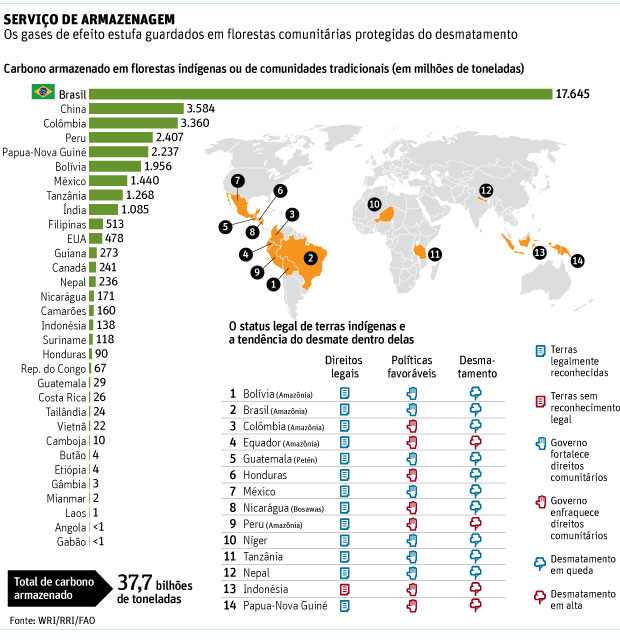Latest Photo Galleries
Brazilian Markets
17h39 Bovespa |
+0,74% | 125.124 |
16h43 Gold |
0,00% | 117 |
17h00 Dollar |
-0,97% | 5,1993 |
16h30 Euro |
+0,49% | 2,65250 |
ADVERTISING
Indigenous People Help Stop Global Warming
07/25/2014 - 09h27
Advertising
RAFAEL GARCIA
FROM SÃO PAULO
Forests on indigenous lands hold 37.7 billion tons of CO2 worldwide. If they were destroyed, the carbon released into the air would surpass global emissions of vehicles for 29 years.
Luckily, the Indians have been more effective than any other human group in combating deforestation.
These numbers are from a report released by NGOs WRI (World Resources Institute) and RRI (Rights and Resources Initiative).
Researchers of the two entities crossed forest preservation numbers from indigenous and traditional people with data from the FAO (United Nations Food and Agriculture) on forest biomass. Research was done in 2013.
According to the report, about one-eighth of the tropical forests area today is within these areas. Compared to forests that are outside the Indigenous jurisdiction, the land not in that area has displayed a weak protection rate.
In the Brazilian Amazon, forests not in the indigenous land have a deforestation rate 11 times higher.
In the Guatemalan forests, home to Mayans descendants, the protection rate is 20 times higher, and in the rest of the Yucatan is 350 times higher - Indigenous people are virtually the only type of protection there.
Part of the reason for this is that developing countries, home to most of the preserved forests, often lack the resources to implement surveillance against illegal deforestation, whether within or outside protected areas.
It is often better to recognize the right of indigenous communities to land and give them autonomy to manage an area than turn it into an ecological reserve and hire guards.
However, the report does not comment on the proposed constitutional amendment 215, being debated in the Brazilian Congress, providing the legislative power the right to demarcate indigenous lands, complicating the process.
Translated by SIMONE PALMA
Read the article in the original language
| Alex Argozino/Editoria de Arte/Folhapress | ||
 |



